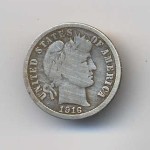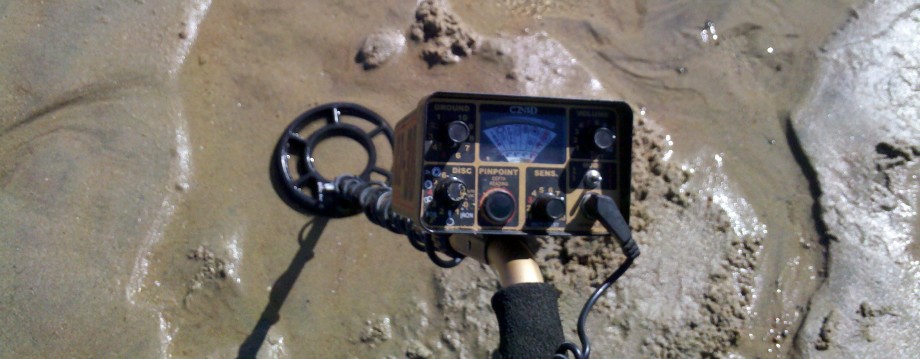SILVER COIN FINDS
A question I hear over and over is, what's the best way to clean my metal detecting finds? Unfortunately the answer is not so simple because every find is unique and cleaning your finds must be carefully thought out. In most cases regarding key-date coins and old antique items, you should not clean them.
Even before you get home with your finds consider this; Let's say your at the local park and you get a nice tone while metal detecting and cut a plug, out pops a silver dime but it's caked in dirt. You're excited and really curious about what kind of dime is it, what date is it, and you swipe your finger across the dime ever so gently, at least you think it was gently, well you may have just ruined a great find (see scratches on the dime below for an example).

You suddenly realize that the dime you just dug up is a 1916D Mercury Dime, the king of Mercury Dimes, excited even more you get home put it under running water to get the loose dirt off and then put it in a coin holder for sending it out to be graded.
A couple weeks go by and you get the graded coin in the mail and excited you tear the package open and you find the dime has a reduced grade due to surface scratches and your potentially $2000 coin is now worth about half that or even less. Now if you cleaned the coin by soaking it in vinegar or scrubbed it with a toothbrush and baking soda, chances are it would be returned as "ungradeable," so don't even consider it.
What I do is, when I head out for land metal detecting I bring a plastic pill bottle half filled with olive oil. If I dig a silver coin I will blow off whatever dirt that I can and then put it in the pill bottle with the olive oil. Olive oil will not harm your silver coins. REMEMBER, never rub a silver coin find with your fingers, that will scratch the surface.
If you place your silver coin finds in your finds pouch just the movement while you continue to hunt can cause the dirt, gravel & sand in your pouch to scratch them. If I'm saltwater beach hunting most silver coins come out of the sand very "crusty" so cleaning isn't really an issue so I just put them in my finds pouch.
So, in summary, do not field clean (swipe finger across to remove dirt) any silver coins you find while metal detecting. If you are not sure of the date of the coin you dug put it in a seperate bottle with olive oil or put them in tissue or separate pocket of your finds pouch. When you get home hold it under running water and if you still have caked on dirt you can gently remove what you can with a toothbrush but don't scrub it. Once you know what you have you can decide if you want to clean it any further.
Once I know it is not rare or a key-date I usually use a toothbrush and baking soda or I sometimes tumble all of my non key-date silver coins and clad. I may even gently (a few minutes) hit it with electrolysis, but again only if it's not a key-date, and then tumble.
COPPER COIN FINDS

Much of what I recommended for silver coins applies to coppers also. For example, after pulling a copper coin from the ground try to resist the temptation to swipe your finger across it to try and read the date or identify it. Granted, copper coins are not as soft a metal as silver but why risk it?
Some will say to also put your Large Cents, Eagles and Indians in olive oil but I don't recommend that since it may darken coppers. I'm not really sure about that but I would rather err on the side of caution.
What I do with Large Cents is again, blow off whatever dirt I can and then place it in between tissue paper before putting it in a pocket or finds pouch.
When I get home I run warm water on it and pick at it with a wooden toothpic to see if I can read a date. If I find the date and it is a rare or key-date I will just soak it in warm water and some dish soap like Dawn.
Then after a day of that gently with a toothbrush and toothpic clean it a little further but not to rough. If it is a rare or key-date copper and you eventually want to sell or grade it, you don't need or want to clean it beyond that.
If you are not concerned with preserving it then clean away, however I do not recommend vinegar, ammonia or peroxide being used on your copper coin finds. That will drastically change not only the favorable patina but also could damage the coin surface.

